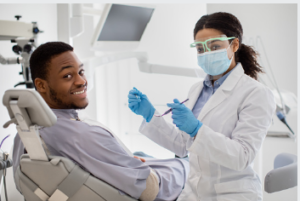No matter the time of day or night, an emergency dentist North Shore is available to treat your dental needs. You are covered for all oral healthcare requirements, from chipped and abscessed teeth to missing teeth.
If you’ve ever faced a dental emergency, you know how frightening it can be. But, seeking treatment immediately is essential to get relief and avoid further issues.
Symptoms
 At an emergency visit to the dentist, they will examine your mouth to identify any issues. It may involve taking x-rays or other diagnostic tools to reveal what’s wrong with your teeth and gums.
At an emergency visit to the dentist, they will examine your mouth to identify any issues. It may involve taking x-rays or other diagnostic tools to reveal what’s wrong with your teeth and gums.
Emergency dentistry can be necessary when the condition causes pain, swelling or bleeding that cannot be controlled with over-the-counter medications. Fortunately, an emergency dentist offers swift solutions for these concerns so you can resume living without serious repercussions.
Signs that your dental emergency may arise include intense tooth pain, bleeding from the mouth, loose teeth, and infections. While some symptoms may seem minor enough to delay an appointment with your dentist, the sooner you seek treatment, the better.
1. Severe Tooth Pain and Swelling – If you experience sharp, stabbing, or aching pain in the mouth, there may be an underlying issue such as decay, exposed roots, or an abscess that needs to be addressed. It could indicate an urgent dental need.
2. Bleeding from the mouth – Broken or chipped teeth and injuries to the mouth and face may cause this. While excessive bleeding in the mouth is rare, it could indicate an underlying issue.
3. Cracked or fallen-out old fillings or crowns – If your old filling has cracked or fallen out, this could indicate an infection in the area. To avoid additional bacteria or infection-causing cavities, get a new fill as soon as possible.
4. Bad Taste in the Mouth – While everyone’s palate differs, a metallic or unpleasant taste in your mouth could indicate an underlying problem. A qualified emergency dentist can replace your existing filling with a fresh one and eliminate any bacteria left behind.
5. Gum inflammation – Gum inflammation is another sign that requires immediate dental attention. It occurs due to bacteria in the mouth causing infection and inflammation, leading to painful and tender gums.
Diagnosis
Emergency dentists are well-equipped to diagnose and treat dental emergencies quickly. In addition, they have the expertise to determine the necessary treatment, often having patients book an appointment on the same day of their incident.
Various things, such as trauma to the mouth, tooth decay or gum disease, or an infection, can cause dental emergencies. These issues must be treated promptly to avoid life-threatening situations like abscesses or severe bleeding.
Broken or knocked-out teeth are common emergency concerns, often resulting from trauma to the jaw and mouth from a fall, sports accident, or biting into something hard like ice or nuts.
If your tooth has broken, keep the area clean and avoid eating anything that could further aggravate the damage. Doing this can help save the affected tooth, and an emergency dentist can guide the best course of action for a successful recovery.
A loose tooth is an even more frequent emergency and should be addressed immediately. A crack or chip in the tooth could lead to permanent gaps in your smile if not addressed promptly.
Another warning sign of an urgent problem is pain from a cracked or broken tooth. If the discomfort is intense and lasts even after brushing your teeth, then this indicates a more severe issue needs to be addressed right away.
Other signs you should see an emergency dentist include swollen gums, a sudden headache and pain from an abscess or infection. These symptoms usually necessitate medical intervention, such as visiting the hospital.
Unfortunately, a good emergency dentist North Shore can usually save a dislodged or broken tooth. Therefore, seeking treatment as soon as possible is essential to avoid needing more extensive procedures like root canals. They’ll closely examine your mouth and teeth during an appointment with them to identify what’s causing your discomfort. If the source is unknown, they may prescribe medication to reduce pain until an appointment for examination and diagnosis can be scheduled.

